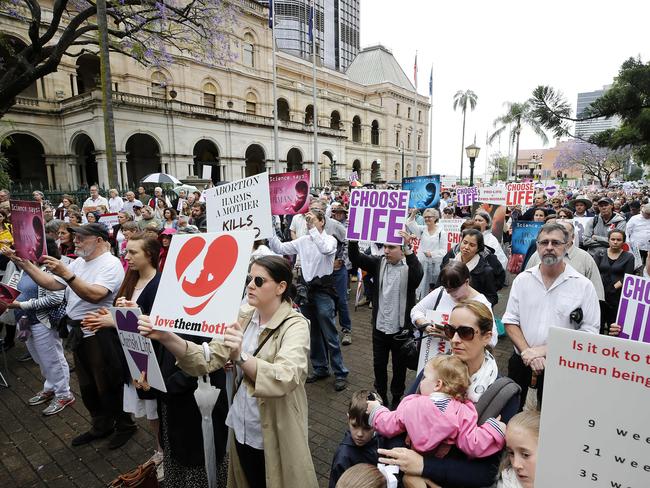Barriers that block access to ‘compassionate’ Qld abortions
Three years after it was decriminalised, Queensland women are still hitting major barriers to getting a safe abortion, with some forced to turn to dangerous alternatives.
QLD News
Don't miss out on the headlines from QLD News. Followed categories will be added to My News.
Affordability, unsupportive doctors, violence and stigma have prevented Queenslanders from accessing abortions, prompting calls for all levels of government to work together to enable greater access.
A new University of Queensland study has revealed there are still barriers to accessing an abortion, despite its decriminalisation more than three years ago.
It found Queenslanders had considered using unsafe abortion practices, such as researching black market pills, or had undertaken self-harm.
“The decriminalisation of TOP (termination of pregnancy) was necessary, but not sufficient to protect women and pregnant people’s reproductive autonomy,” the study found.
“Inclusive, multi-sectoral action to eliminate barriers to TOP access is still needed in Queensland.

“Investment in workforce development and service planning in both primary and tertiary health care sectors, and in partnership with health consumers, is urgently needed to address barriers to ensure access to safe, compassionate, and timely TOP.”
The research team, which analysed almost 2000 client records that were collected by the pregnancy counselling service Children by Choice between December 2018 and June 2020, found Queenslanders commonly reported having seen unsupportive doctors.
“Health-care practitioner (HCP) stigma and conscientious objections to providing TOP information and referral were identified as key barriers for clients navigating the health care system,” the study read.
“HCP refusal to refer caused major frustration and delays in accessing TOP.
“Unsupportive health care professionals also created informational barriers, with clients reportedly receiving incorrect or misleading advice.”
The study found that where abortions could not be accessed through the public system, it remained “a costly health care experience in the private sector”.

“With TOP-associated costs ranging from $200 to $17,000 depending on the location, situation, and gestation, for those lacking the financial means, this resulted in distress, considerable mental burden, and delayed access to services,” it read.
It also found coercion, partner violence and sexual assault were commonly reported when someone sought pregnancy counselling.
And that delays and barriers to accessing an abortion “generated frustration along with reports of unsafe TOP and self-harm, including researching black-market pills and online methods on self-TOP or attempting self-harm to procure a miscarriage.”
The study also found Covid-19 restrictions exacerbated some barriers.
“Future policies and health care must take into consideration the broad factors affecting TOP access and specifically focus on preventive models of care that remove cost burden, integrate comprehensive sexual and reproductive education for both professionals and consumers, identification of violence, and elimination of stigma,” the report read.




